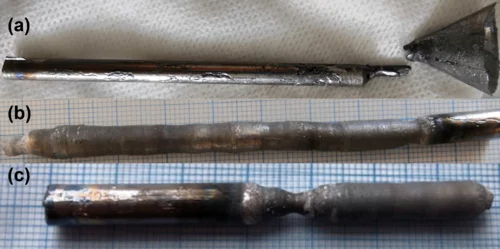Abstract:
We explore two methods for single-crystal growth of the theoretically proposed magnetic Weyl semimetals RAlGe (R = Pr, Ce), which prove that a floating-zone technique, being both crucible- and flux-free, is crucial to obtain perfectly stoichiometric RAlGe crystals. In contrast, the crystals grown by a flux-growth technique tend to be Al-rich. We further present both structural and elemental analyses, along with bulk magnetization and electrical resistivity data on the crystals prepared by the floating-zone technique. Both systems with the intended 1:1:1 stoichiometry crystallize in the anticipated polar I41md (No. 109) space group, although neither displays the theoretically expected ferromagnetic ground state. Instead PrAlGe displays a spin-glass-like transition below 16 K with an easy c-axis and CeAlGe has an easy-ab-plane antiferromagnetic order below 5 K. The grown crystals provide an ideal platform for microscopic studies of the magnetic field-tunable correlation physics involving magnetism and topological Weyl nodes. https://intranet.psi.ch/wiki/bin/edit/lmx-ssc/HomeEN#save
Keywords: Magnetic Phase Transition; Topological Material; Weyl Semimatals; Crystal Growth;
Facility: SSC, LMX, LNS, SINQ
Reference: P. Puphal et al., Phys. Rev. Materials 3, 024204 (2019)
Read full article: [here]

